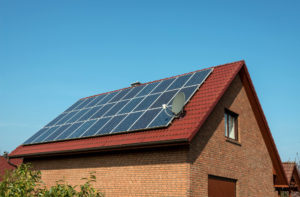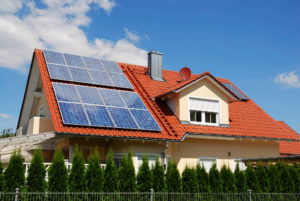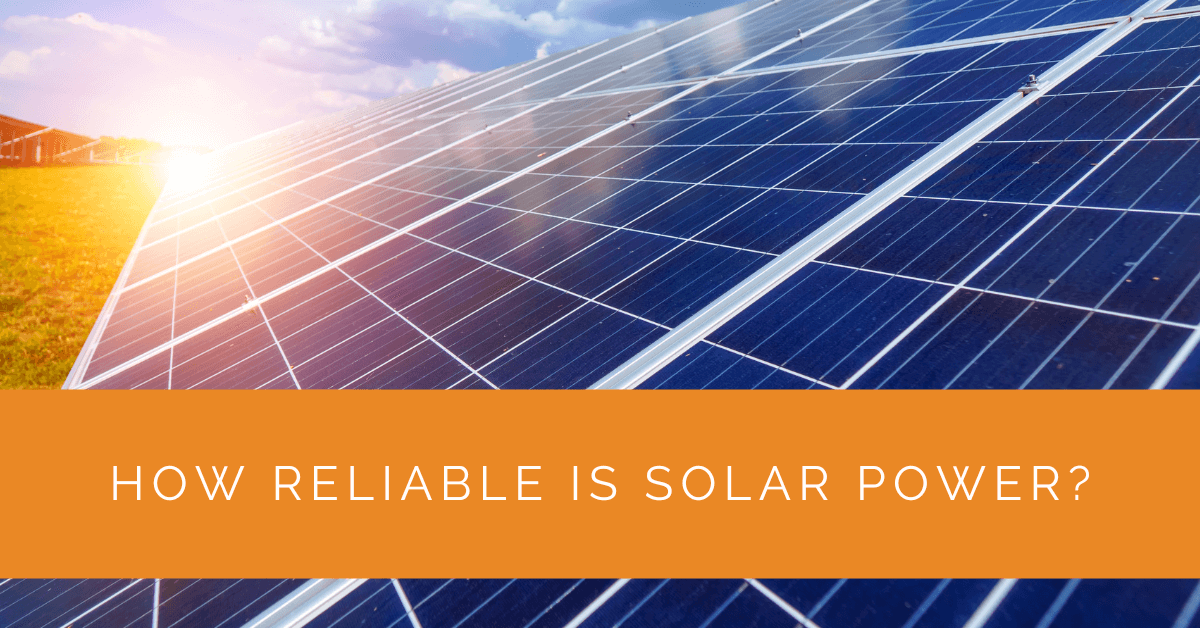The growing interest in renewable energy has spotlighted solar power as a reliable and sustainable energy source. As we delve into solar power reliability, we will explore its advantages over fossil fuel-based energy sources, examine the factors affecting reliability, and discuss the role of solar systems in the grid. Join us on this enlightening journey to uncover the reliability of solar power and its potential for a brighter future.
Contents
- 1 Key Takeaways
- 2 Understanding Solar Power Reliability
- 3 Factors Affecting Solar Power Reliability
- 4 Reliability of Solar Power vs. Other Energy Sources
- 5 Solar Power and the Grid
- 6 Ensuring Solar Power Reliability
- 7 Case Study: Ensuring Solar Power Reliability in Residential Installations
- 8 Expert Insights From Our Solar Panel Installers About Solar Power Reliability
- 9 Experience Solar Excellence with Us!
- 10 Conclusion
Key Takeaways
- Solar power offers reliability as a sustainable and abundant energy source, with benefits such as low maintenance costs and environmental resilience.
- Solar power reliability factors influence weather conditions, system design, and component quality.
- Integrating solar power systems with the grid enhances reliability, promotes energy independence, and enables backup power during outages.
Understanding Solar Power Reliability
Solar power has gained widespread recognition as a reliable and sustainable energy source. Understanding the factors contributing to its reliability is crucial for those considering solar power systems. By delving deeper into the concept of solar power reliability, we can explore its benefits and the key factors that influence its dependability.
Benefits of Solar Power Reliability
Solar power’s reliability stems from its renewable nature. As the source of solar energy, the sun provides an abundant and consistent power supply. Unlike fossil fuels, which are finite and subject to price volatility and geopolitical tensions, solar power offers long-term stability and independence from external factors. By tapping into this renewable energy source, individuals and communities can reduce their reliance on traditional energy sources and contribute to a greener and more sustainable future.
Factors Influencing Solar Power Reliability
Several factors influence the reliability of solar power systems, ensuring optimal performance and power generation:
- Weather Conditions: Solar power production relies on sunlight. Therefore, weather conditions play a significant role in solar power reliability. While solar panels can still generate electricity on cloudy days, direct sunlight maximizes energy output. Areas with more sunshine hours tend to have higher solar power reliability. However, advancements in solar panel technology, such as bypass diodes, allow panels to mitigate the impact of partial shading and enhance overall reliability.
- System Design and Equipment Quality: The design and quality of the solar power system components directly impact reliability. High-quality solar panels with efficient power output ensure optimal energy production. Inverters responsible for converting the DC power generated by solar panels into usable AC power should be selected carefully. A well-designed system, tailored to the specific energy needs and geographical location, ensures reliability and longevity. Additionally, using certified and reputable solar equipment manufacturers and working with experienced installers further enhances system reliability.
- Energy Storage Solutions: Energy storage systems, such as solar batteries, contribute to the reliability of solar power. These batteries store excess energy generated during periods of peak sunlight for use during low or no sunlight, such as cloudy days or at night. By integrating energy storage, solar power systems can provide a consistent and reliable power supply even when the sun is not shining. This reduces dependence on the grid and improves energy independence.

Factors Affecting Solar Power Reliability
To understand the reliability of solar power, it’s essential to examine the key factors that can impact the performance and dependability of solar power systems:
Weather and Environmental Conditions
Weather conditions significantly influence the reliability of solar power generation. Cloud cover, shade from nearby objects or structures, and atmospheric factors can temporarily reduce the power output of solar panels. However, even under suboptimal weather conditions, solar panels can still generate electricity. The advancements in solar panel technology, such as bypass diodes, allow panels to minimize the impact of shading and improve overall reliability.
Furthermore, environmental factors like temperature can also affect solar panel performance. High temperatures can decrease the efficiency of solar panels, while extreme cold can reduce power output. However, modern solar panels are designed to withstand varying environmental conditions and maintain reliable power generation.
System Design and Component Quality
The design and quality of the solar power system components are critical factors affecting reliability. An effectively designed solar system considers geographical location, available sunlight, and energy needs. Properly sized and positioned solar panels, high-quality inverters, and well-designed wiring and mounting systems contribute to optimal performance and long-term reliability.
Selecting reputable solar equipment manufacturers ensures the use of high-quality components that meet industry standards and are built to withstand environmental conditions. Additionally, working with experienced and certified solar installers ensures proper installation and adherence to best practices, reducing the risk of system failures and maximizing reliability.
Maintenance and Regular Maintenance and Monitoring
Regular maintenance and monitoring are crucial for ensuring the long-term reliability of solar power systems. Here are some key considerations:
- Cleaning: Periodically clean the solar panels to remove dust, dirt, or debris that may accumulate on the surface. Clean panels allow for maximum sunlight absorption and maintain optimal power generation.
- System Inspections: Schedule routine inspections to identify any potential issues or malfunctions. Inspect the wiring, connections, and other components to ensure they are in good condition. Promptly address any signs of damage or wear to prevent further complications.
- Monitoring Performance: Utilize monitoring systems to track the performance of your solar power system. Monitoring allows you to identify any drop in power output or anomalies, enabling you to take corrective actions promptly. Regular monitoring helps ensure that your system is highly efficient and reliable.
- Inverter Maintenance: Inverters are crucial components of a solar power system. Follow the manufacturer’s recommendations for inverter maintenance, which may include routine inspections, software updates, and cleaning. Regular inverter maintenance helps optimize system performance and reliability.

Reliability of Solar Power vs. Other Energy Sources
Solar power stands out as a highly reliable energy source compared to traditional sources such as fossil fuels. Here’s why:
- Abundant Resource: Solar power relies on the sun, an abundant and virtually limitless energy source. Unlike fossil fuels, which are finite and susceptible to depletion, solar power offers a consistent and reliable energy source.
- Low Maintenance and Operational Costs: Solar power systems require minimal maintenance and low operational costs once installed. This reduces the risk of unexpected expenses and improves long-term reliability.
- Environmental Resilience: Solar power systems have a lower environmental impact than fossil fuel-based power generation. Solar panels produce clean energy without greenhouse gas emissions, making solar power more resilient in the face of environmental concerns such as climate change regulations and policies.
- Energy Independence: Solar power provides individuals and communities with greater energy independence. By generating electricity on-site, solar power users are less reliant on the grid and are better equipped to handle power outages or disruptions.
Solar Power and the Grid
Integrating solar power systems with the electrical grid improves reliability and stability. Here’s how solar power benefits the grid:
- Grid-Tied Systems: Grid-tied solar power systems allow excess energy to be fed back into the grid. This reduces reliance on fossil fuel-based generation and contributes to grid stability and resilience. During high solar energy production periods, excess power can be utilized by other consumers, reducing strain on the grid.
- Net Metering: Net metering programs enable homeowners and businesses to receive credits for the surplus energy they produce and feed into the grid. These credits can offset future energy consumption when solar power generation is lower, providing financial benefits and promoting grid stability.
- Backup Power: Solar power systems can incorporate battery storage to provide backup power during grid outages. This improves the reliability of power supply, especially in areas prone to natural disasters or with unreliable grid infrastructure.
By interconnecting solar power systems with the grid, solar energy becomes integral to a resilient and sustainable energy infrastructure.
Ensuring Solar Power Reliability
To ensure the long-term reliability of solar power systems, consider the following practices:
- Choose Quality Equipment: Select solar panels, inverters, and other system components from reputable manufacturers known for their reliability and performance. Quality equipment is more likely to withstand environmental conditions and provide consistent power output over the system’s lifespan.
- Professional Installation: Work with certified solar installers with the expertise to design and install reliable solar power systems. Professional installation ensures the system is optimized for performance and all components are correctly integrated.
- System Monitoring: Implement a monitoring system to track the performance of your solar power system. Monitoring allows you to identify any deviations or issues promptly. By closely monitoring the system’s performance, you can ensure optimal energy production and quickly address potential problems.
- Regular Maintenance: Follow a regular schedule to keep your solar power system in optimal condition. This includes cleaning the panels, inspecting connections, and ensuring all components function properly. Regular maintenance helps prevent issues, prolongs the system’s lifespan, and enhances reliability.
- Educate Yourself: Take the time to understand your solar power system and its components. Educate yourself about its operation, maintenance requirements, and potential troubleshooting steps. Knowing your system enables you to detect and resolve minor issues independently, improving reliability.
- Battery Storage Integration: Consider incorporating energy storage solutions like solar batteries into your system. Battery storage allows you to store excess energy generated during the day for use during nighttime or periods of low solar power production. A backup power source can enhance reliability and access electricity even when the sun is not shining.
- Plan for Future Expansion: If your energy needs are expected to increase, plan your solar power system with scalability in mind. Ensuring the system can accommodate additional panels or higher capacity inverters will allow for seamless expansion and continued reliability as your energy demands grow.
By adhering to these practices, you can optimize the reliability of your solar power system and ensure a consistent and sustainable source of energy for years to come.
Case Study: Ensuring Solar Power Reliability in Residential Installations
Background
At Solar Panels Network USA, our mission is to provide reliable and sustainable solar energy solutions to homeowners. This case study highlights a residential solar power installation designed to maximize reliability and performance through careful planning, quality components, and regular maintenance.
Project Overview
Our client, a homeowner committed to reducing their carbon footprint and achieving energy independence, sought a reliable solar power solution for their home. They approached us to design and install a system that would consistently meet their energy needs while minimizing environmental impact.
Implementation
Assessing Energy Requirements
We began by evaluating the client’s energy consumption patterns and peak power requirements. This analysis helped us determine the appropriate size and capacity for the solar power system.
Evaluating Sunlight Availability
Next, we assessed the sunlight availability at the installation site. We conducted a thorough analysis to identify potential shading from nearby trees, buildings, or other structures. Ensuring the site received adequate sunlight throughout the day was crucial for maximizing system efficiency.
Selecting Quality Components
Based on our assessment, we selected high-efficiency solar panels and inverters from reputable manufacturers known for their reliability and performance. We also integrated a battery storage system to store excess energy generated during peak sunlight hours for use during nighttime or cloudy days.
System Design
We designed a comprehensive solar power system tailored to the client’s energy needs and environmental conditions. The design included:
- Solar Panels: High-efficiency panels installed on the roof to capture maximum sunlight.
- Inverters: Reliable inverters to convert DC electricity from the panels into AC power for home use.
- Battery Storage: A robust battery system to store excess energy and provide backup power during grid outages.
Installation and Integration
- Mounting Solar Panels: We securely mounted the solar panels on the client’s roof, ensuring they were optimally positioned for maximum sunlight exposure. The panels were installed at the ideal angle and orientation to capture the most sunlight throughout the day.
- Connecting the System: We connected the solar panels to the inverters and integrated the battery storage system. This setup ensured that the generated electricity was efficiently converted and stored for later use.
- System Integration: Our team worked closely with the client to integrate the solar power system with their existing electrical infrastructure. This included collaborating with certified electricians to ensure safe and seamless connections.
Results
The implementation of the solar power system delivered impressive results:
- Reliable Energy Source: The solar power system provided a consistent and reliable source of electricity, meeting the client’s energy needs and reducing their reliance on the grid.
- Cost Savings: The client experienced significant reductions in their energy bills due to the efficient and sustainable energy produced by the solar panels.
- Environmental Benefits: By harnessing solar power, the client significantly reduced their carbon footprint and contributed to a cleaner and more sustainable environment.
- Client Satisfaction: The client was highly satisfied with the system’s performance and the professional installation process. They appreciated the thorough planning and quality components that ensured optimal functionality and longevity.
Summary
This case study demonstrates the successful design and installation of a reliable residential solar power system. By carefully assessing energy requirements, selecting high-quality components, and ensuring proper installation and integration, we provided our client with a dependable and sustainable energy solution. At Solar Panels Network USA, we are dedicated to delivering innovative solar energy solutions that meet our clients’ needs and promote environmental sustainability.
Expert Insights From Our Solar Panel Installers About Solar Power Reliability
Solar power’s reliability is unmatched due to its renewable nature. Unlike fossil fuels, the sun provides a consistent and abundant energy source that we can harness for years to come.
Senior Solar Technician
Integrating solar power systems with the grid and using high-quality components ensures optimal performance and longevity. Regular maintenance and monitoring are key to sustaining reliable energy production.
Lead Installer
Understanding the factors that impact solar power reliability, such as weather conditions and system design, helps us optimize installations for maximum efficiency and durability.
Solar Energy Consultant
Experience Solar Excellence with Us!
Trust in Solar Panels Network USA, where our seasoned experts deliver top-quality solar solutions for homes and businesses nationwide. With a legacy of countless successful installations and a commitment to sustainable energy, we’re your reliable partner in the solar journey. Ready for a brighter, eco-friendly future? Call us now at (855) 427-0058 and harness the power of the sun!
Conclusion
Solar power has emerged as a reliable and sustainable energy source, offering numerous advantages over fossil fuel-based alternatives. Understanding the factors that impact solar power reliability, such as weather conditions, system design, and equipment quality, is essential for maximizing performance and longevity. Integration with the electrical grid further enhances the reliability of solar power systems, contributing to a more resilient and sustainable energy infrastructure.
By investing in solar power and adopting best practices, such as regular monitoring, maintenance, and working with certified installers, homeowners can harness the reliability and benefits of solar energy. As we continue to embrace renewable energy solutions, solar power stands as a beacon of reliability, paving the way for a cleaner and more sustainable future.
Embrace the potential of solar power and experience its reliability firsthand. Join today’s renewable energy revolution and enjoy the benefits of a clean, sustainable, and reliable energy source.
Remember, with proper system design, equipment quality, and regular maintenance, solar power can provide you with a reliable and long-lasting energy source for years. Choose solar power and power your future with the sun’s abundant and reliable energy.
About the Author
Solar Panels Network USA stands at the forefront of solar energy solutions, driven by a team of seasoned solar engineers and energy consultants. With over decades of experience in delivering high-quality solar installations and maintenance, we are committed to promoting sustainable energy through customer-centric, tailored solutions. Our articles reflect this commitment, crafted collaboratively by experts to provide accurate, up-to-date insights into solar technology, ensuring our readers are well-informed and empowered in their solar energy decisions.

